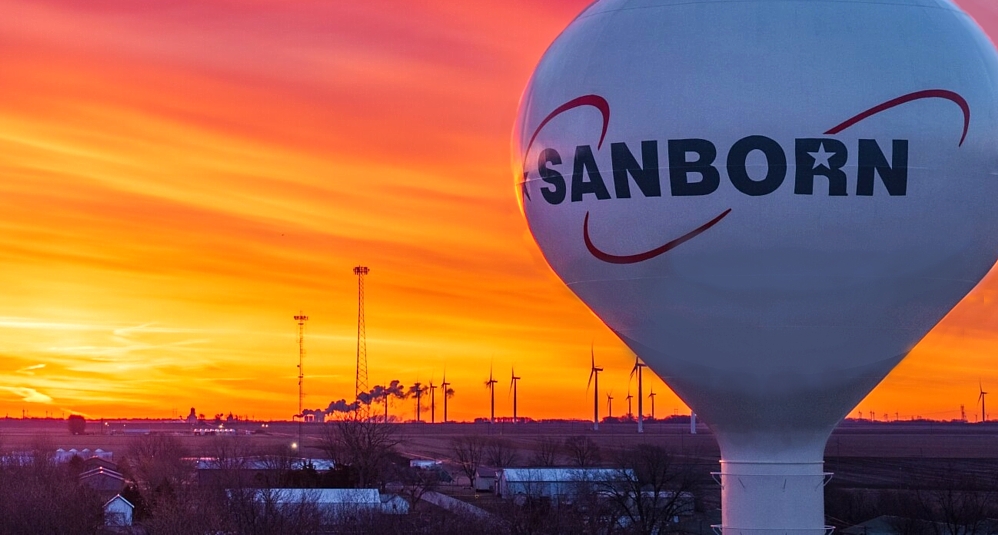
Clark Kauffman/Iowa Capital Dispatch
A cheese manufacturer is suing the Iowa city of Sanborn for water contamination that allegedly infiltrated the plant and caused $4 million in damages.
The Minnesota dairy cooperative Associated Milk Producers Inc., or AMPI, is suing not only the City of Sanborn in federal court, but also the company hired by the city to clean the municipal water tower, Maguire Iron of South Dakota.
AMPI operates an 80-year-old plant in Sanborn where each day, it produces 280,000 pounds of cheese. As part of the production process, the plant consumes 300,000 gallons of water each day.
In late 2021, the city hired Maguire Iron to clean, maintain and sandblast the municipal water tower. In the summer of 2022, the lawsuit claims, the city drained the water tower, allowing Maguire to begin its work inside and around the structure.
AMPI alleges Maguire negligently performed its sandblasting of the tower’s interior by using jagged shards of a toxic black sandblasting aggregate commonly called black magic. Maguire allegedly used the aggregate to clean the tower’s interior surfaces without first sealing the intake and outflow pipes that route water in and out of the tower.
That alleged failure to seal the pipes resulted in “sandblasting aggregate and other spent cleaning debris entering the city’s water system and subsequently infiltrating the Sanborn plant,” the lawsuit claims.
When Maguire finished its work, city officials attempted to refill the tower and noticed sandblasting aggregate flowing out of a standpipe valve connected to the tower. City workers then spent several hours attempting to flush the aggregate out of the pipes and then resumed their efforts to refill the tower, the lawsuit alleges.
When that work was completed, the city had the water tested for bacteria. When the test indicated there was no bacteria present, the city allegedly opened the valves from the tower and restored the flow of water to not just the AMPI plant but to other businesses and homes that rely on the tower.
Within days, officials at the plant allegedly discovered large amounts of sandblasting aggregate in its water, its equipment and in the cheese that had recently been processed. The lawsuit claims the amount of contamination was so significant that the aggregate from within the tower had “blasted AMPI’s filters off,” leaving piles of black aggregate forming on the plant’s floor.
As a result of the incident, AMPI alleges, it had to discard “cheese worth nearly $4 million that had been contaminated and was unsafe for consumption.”
Mayor: Residents didn’t complain of contamination
In its lawsuit, AMPI argues the city “negligently performed its role in the maintenance and repair services on the water tower,” alleging it failed to hire a third-party inspector to monitor Maguire’s work on the water tower.
“The city should have notified Maguire, or hired a third-party, to ensure the city’s water supply was free of dangerous sandblasting aggregate and spent cleaning debris before providing such contaminated water to the city’s water users,” AMPI alleges.
The city has yet to file a response to the lawsuit. A claim of $4 million in damages equates to $2,803 for each of Sanborn’s 1,427 residents.
With regard to contaminated water that may have flowed to other city businesses and to residents’ homes, the city’s attorney, Daniel DeKoter, said he has heard of no such concerns.
“That’s not something I have ever been told,” he said Thursday. “And I think something like that would have been brought to my attention as the city’s attorney.”
Mayor Randy Lyman said Thursday that while the city didn’t test residents’ water for the presence of black aggregate, it did perform other types of testing that indicated the water was safe. Asked why the supply wasn’t tested for the presence of the sandblasting aggregate, Lyman said, “We had no complaints from residents about any aggregate in the water.”
Lyman added that because the cheese plant is first in line to collect water from the tower, and because it is such a heavy user, the plant “sucks so hard” in drawing water from the tower that any contaminants would have gone directly to the plant rather than to other users.
City Administrator Jim Zeutenhorst did not respond Thursday to a request for comment.
